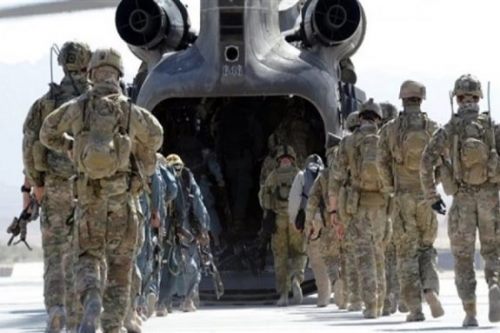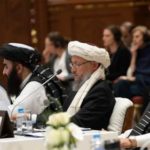It threatened to disappear under the viral haze of COVID-19, but February 29 saw representatives from the US and Taliban, loftily acknowledged as the Islamic Emirate of Afghanistan, sign the “Agreement for Bringing Peace to Afghanistan”. After two decades of conflict, the agreement sets in motion the process that should see American troops leave Afghanistan within 14 months. Initially, 8,600 troops will leave over a 135-day period; the balance is set to do so after 9 months.
The Doha ceremony was attended by US Secretary of State Mike Pompeo and Taliban deputy leader Mullah Baradar, a person said by former CIA Operations Officer Douglas London to be of “little influence or authority” serving as “convenient window dressing”. The ink from the US side for the signature was supplied by US peace envoy Zalmay Khalilzad. Conspicuously absent, and much in recognition of the failings of that institution, was the NATO-backed Afghan government. Nor was the Taliban present in the joint US-Afghan declaration. The results of that say much about the sheer will power, not to mention staying power, of Taliban negotiators. It was they who insisted not to be part of any instrument acknowledging the legitimacy of the Afghan government.
In sum, both instruments lay out various steps for the Taliban, US and Afghan government to take. The Taliban are to prevent their territory from hosting groups or individuals who might threaten the US and their allies; the US is to draft a timeline for the withdrawal of all US and coalition forces; the Afghan regime and the Taliban are to commence peace talks at the conclusion of the withdrawal, with the parties ultimately developing the basis for a permanent and comprehensive cease-fire.
Having stolen the show, the Taliban has merely promised to engage in talks with the Afghan government about a lasting peace; cunningly, even brashly, they have refused to specifically renounce resorting to violence in achieving their aims. It will be hard to refute the claim that they have their opponents on the run and intend keeping it that way.
The deal will be another etching on the long list of agreements made in the cemetery of imperial failure. Afghan resistance can rightly claim the scalps of many, including Britain and the Soviet Union. Afghan president Ashraf Ghani has approved the release of 1,500 Taliban prisoners in exchange of 1,000 government troops. The decree signed by Ghani noted that the prisoners will be released within 15 days “with 100 prisoners walking out of Afghan jails every day.” The US-Taliban agreement intends for the release of up to 5,000 Taliban prisoners.
The joint US-Afghan declaration, for its part, has the Afghan government promising to “participate in a US-facilitated discussion with Taliban representatives on confidence building measures, to include determining the feasibility of releasing significant numbers of prisoners on both sides.”
On March 10, the UN Security Council gave the US-sponsored resolution supporting the deal their unanimous blessing, deeming it one of the “significant steps towards ending the war” and promising to provide “sustained support” in negotiations to achieve peace. It also spoke of “the willingness of multiple countries to facilitate or convene intra-Afghan negotiations in order to achieve political settlement and a permanent and comprehensive cease-fire.”
But this vote of confidence does not detract from the possibility that the US will still maintain a presence, or that conflict will continue. The US-Afghan joint declaration, for instance, takes the position that the withdrawal of US forces will eventuate on the “Taliban’s fulfilment of its commitments.”
Those barracking for some continuing US footprint are many, though the years have taken their toll. Paul D. Miller, formerly of the National Security Staff for both President George W. Bush and Barack Obama, sees inadequacies and threats in the brokered deal. Tear up the agreement, he urges in Lawfare; al-Qaeda is likely to return in force and find a place of, if not hospitality then certainly sanctuary. “President Trump and his successor should scrap the deal and increase military pressure until the Taliban publicly denounces al-Qaeda and agreed to verifiably sever links with the group.” US commitments were “clear, specific and measurable”; those of the Taliban, lacking in detail, means of enforcement and verification.
Miller’s view that the US remain is based on a certain contempt for the US public and, it must be said, the armed forces. To maintain the imperium, you need to ignore the former, at least to a certain extent, and use the latter. The troop presence is not large, expensive or costly in terms of casualties. “There is no mass anti-war movement. The American people are not sick of the war: They are hardly even paying attention to it.”
London concurs on most points. He sees the Taliban with the same conviction that took US forces to Afghanistan in the first place. The agreement “naively relieves the Taliban from renouncing [ties to terrorist groups] or expelling them outright.”
Others nurse the maybes and the tormenting hypotheticals. Lawrence J. Korb, who in 2010 was engaged in negotiating efforts on ending the war in Afghanistan, rued the lost chances of the Bush administration in 2002 to annihilate the Taliban. “It compounded the problem by simultaneously expanding its objective from defeating the Taliban in Afghanistan to nation-building.” This train of thought is persistent in US strategic thinking: insurgents are somehow foreign and not indigenous, lacking local support; they can be culled, restrained or eliminated altogether.
There is little doubt that the resilient, seemingly indestructible Taliban will take greater heart in the entire process than the cheerleaders for empire. They have resumed operations against their enemy with enthusiasm. The unpopular central government is negotiating from a position of profound weakness.
Even Korb, despite lamenting lost opportunities, felt that it was no longer a conflict the US should contend with. “Just as America did not make it out better than France in Vietnam, it is time for its officials to realize that America will not make it out any better than the British or Soviets in Afghanistan – no matter how long it tries to stay.”











